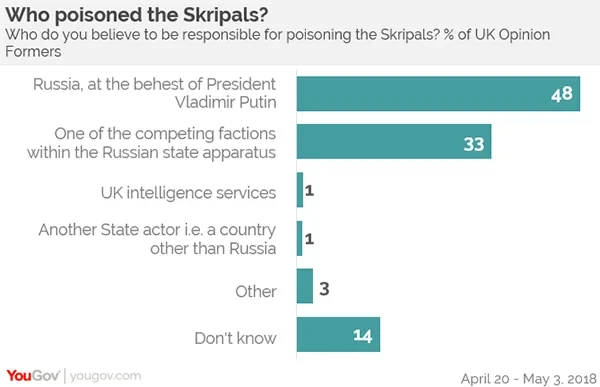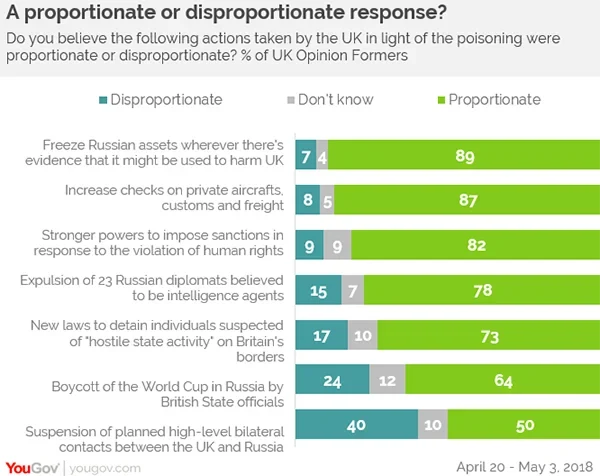As the police wrap up their probe into the poisoning of Sergei and Yulia Skripal, the clandestine world of espionage envelopes and obscures the full picture. While Boris Johnson was quick to state that there was “no doubt” Russia was responsible, the Organisation for the Prohibition of Chemical Weapons (OPCW) stopped short of explicitly blaming the Kremlin.
YouGov asked its Opinion Formers panel, which draws leaders from the worlds of business, politics, the media, charities, public sector and academia among others, their thoughts on the use of nerve agents in the sleepy city of Salisbury.

While the majority of Opinion Formers (81%) agree with the Foreign Secretary’s accusation that the attack did indeed emanate from Russia, there is an interesting split as to who within the country is ultimately culpable. While just under half (48%) think the buck stops with President Vladimir Putin, a sizeable proportion (33%) believe that other elements within the Russian state apparatus may have given the order.

The headline-grabbing expulsion of 23 Russian diplomats was deemed a ‘proportionate response’ to the Skripal poisoning by over three-quarters (78%) of Opinion Formers. Moreover however, the freezing of Russian assets wherever there is evidence it can harm the UK (89%), increased checks on private aircraft, customs and freight (87%) and the strengthening of sanctions in response to human rights violations (82%) were an even more popular set of measures dished out by the Prime Minister.
Interestingly however a sizable minority (24%) feel that UK officials boycotting the World Cup in Russia this summer was a disproportionate response. Moreover, two-fifths (40%) said that the suspension of all planned high-level bilateral contacts between the UK and Russia (such as the cancellation of the planned visit of the Russian Foreign Minister, Sergey Lavrov, to Britain) was a disproportionate response. This shows a clear split in opinion over whether the UK should keep diplomatic channels open with the Kremlin, as half (50%) felt it was a proportionate response to the sullying of Salisbury.
According to a former senior Russian General, Evgeny Buzhinsky, tensions between the West and Russia could get “worse than the Cold War”. Whilst breaking off diplomatic relations might appear to send a strong message that such actions will not be tolerated in the UK, refusing to receive any message at all could prove even more dangerous. During the Cold War there existed a “hotline” between Washington and Moscow to avert miscalculations and global-ending catastrophes. As unpalatable as the thought may be, once again tensions between nuclear-armed nations are on the rise. Perhaps then, as John F. Kennedy so astutely demonstrated when the World came to the brink in 1962, keeping a clear line of communication open with the Kremlin might not be the worst of ideas,
YouGov completed online interviews with 734 opinion formers from its UK Opinion Formers Panel. Opinion Formers are leaders in their field from business, media, politics, NGOs, academia and beyond. Fieldwork was undertaken between 20th April and 3rd May 2018. The figures have not been weighted.
Image Getty







